
At the grand final of the EIT Jumpstarter 2024 competition in Budapest, which this year marked the 10th anniversary of the European Institute of Innovation and Technology (EIT), Ukrainian startup AgRE took second place in the ReBuild Ukraine category. This innovative technology is aimed at solving the global problem of soil degradation and is already demonstrating the potential for a large-scale impact on agriculture both in Ukraine and around the world, SEEDS writes.
“I found out about EIT Jumpstarter thanks to my supervisor, Yurii Ivanovych Danko, who invited graduate students to apply for the competition in the spring of 2024.
As a graduate student at Sumy National Agrarian University (SNAU) with a dissertation topic on the impact of war on agribusiness and its recovery, I saw this program as an ideal opportunity to develop scientific and practical ideas,” says Kateryna Zvereva, a graduate student at SNAU and co-founder of the AgRE startup.
AgRE’s success at EIT Food Jumpstarter
The grand final of The Next Decade of Innovations for the Future of Europe was the culmination of a long selection process that lasted more than six months. Among 49 innovative finalist companies selected from around the world, AgRE has demonstrated its uniqueness and promise.
The participants went through several stages of the competition, including trainings and mentoring from leading industry experts. This year’s ReBuild Ukraine category was specially created to support innovations that contribute to the recovery of Ukraine.
AgRE, which won second place, not only gained international recognition but also confirmed its ability to effectively address the challenges of soil degradation in wartime.

“Soil degradation is one of the most pressing environmental issues of our time. According to the FAO, the world loses 24 billion tons of fertile soil every year, which affects the lives of more than 3 billion people. The level of land erosion in Ukraine was one of the highest in the world, reaching 54%, and in some regions – more than 70% (before the full-scale invasion).
Currently, more than 33% of agricultural land has been severely degraded by military operations, and 4 million hectares suffer from salinity,” says Kateryna Zvereva, co-founder of the startup, PhD student at Sumy National Agrarian University, and Development Director of the Ukrainian Fruit and Vegetable Association.
“AgRE offers an innovative solution – a technology that neutralizes pathogenic salts, reduces soil compaction, and restores pH balance. The technology is versatile and can be applied through any irrigation system or tillage method, making it integrated into existing agricultural practices.
Globally, we are facing an urgent problem of soil degradation, with an annual loss of 24 billion tons of fertile soil, affecting more than 3 billion people. In Ukraine, about 4 million hectares are affected by salinization, which is 6.6% of the country’s territory.
By 2050, there is a potential risk that 95% of the Earth’s surface will be covered by degraded soils. Over the past 130 years, Ukrainian soils have lost 30% of their humus and have experienced a high level of plowing (53%).

Mykhailo Soroka, farmer, co-founder of AgRE:
“The problem of land salinization has been accumulating in Ukraine for decades. It is a latent process that affects not only the south of the country, where irrigation is actively used, but also coastal areas, where the sea breeze gradually deposits salt on the soil. Salinization is a global problem: 25% of the earth’s surface is affected by salt.
We approach it systematically, introducing a technology that can neutralize salts in the soil in 10-20 years, and then switch to a preventive mode to prevent this problem from occurring again.”
“Our technology is based on a chemical reaction that eliminates the main problem – harmful salts. We propose to use the reagent in minimal doses, which neutralizes salt in the soil and creates conditions for its recovery. The soil becomes loose, natural processes are activated, and as a result, agricultural producers are able to use biotechnology even in previously saline areas.”

Kateryna Zvereva, co-founder of AgRE:
“We are creating a revitalizer that literally restores life in the soil. This innovation allows us to solve salinity issues comprehensively and effectively. Our approach is inspired by the successful experience of the United States, which overcame this problem back in the 1980s with the support of the government and business. We are confident that the introduction of this technology in Ukraine will be an important step towards sustainable agriculture and restoration of land productivity.”
War as a catalyst for soil degradation
The destruction caused by the war in Ukraine has added a new dimension to the problem of land degradation. Each explosion leaves a trace in the form of soil contamination and destruction of its fertile layer. This creates an urgent need to implement restoration technologies. AgRE is an example of how innovations can help cope with the consequences of war and at the same time contribute to the sustainable development of the agricultural sector.
Results and prospects
The technology has already been tested as part of a pilot project in the Dnipro region, on the lands of Khlibodar Agrofirm, where a noticeable improvement in soil condition was achieved on 20 hectares of garlic.
“AgRE is not just an innovation, it is a contribution to the global fight against soil salinity. We strive to help agricultural producers not only solve this problem, but also create conditions for the ecological and sustainable development of the agricultural sector in Ukraine and the world,” says Mykhailo Soroka.

EIT Jumpstarter launches innovative startups to address the most pressing societal challenges
At the EIT Jumpstarter Grand Final, 24 new science-based startups were awarded: 49 teams from 21 countries competed in 9 categories, sharing a prize pool of €150,000.
This was the culmination of this year’s edition of the EIT Jumpstarter pre-acceleration program, an initiative of the European Institute of Innovation and Technology (EIT), a European Union body that aims to develop innovative ideas and turn them into promising businesses.

The program has already trained 1,180 participants, resulting in 124 new startups in developing countries and 2,100 new jobs. Plans for 2025 include additional support for talent from Ukraine, the Western Balkans, the Mediterranean, and the farthest reaches of the EU.
“Every year, the number of startups created in countries outside Western Europe by programs like EIT Jumpstarter is growing, and many of them have reached a valuation of millions of euros,” said Peter Boulanger, EIT Jumpstarter program representative.
“This is crucial for closing the funding gap in the European innovation ecosystem. The program helps create new jobs, brings new skills and stimulates entrepreneurship in the region. Given that every euro invested in the program generates 30 euros of external funding for startups, EIT Jumpstarter is truly a springboard for talented entrepreneurs,” he added.
Over the course of the seven-month program, participants identified and tested the best business models for their science-based innovation ideas. The goal was to turn these ideas into market-ready startups. Out of 600 applications, only 180 innovators were selected for training, and the best 49 teams competed in the final in Budapest, which included a dynamic session of live presentations divided into eight industry categories ranging from food technology to energy.

Three winners were selected in each category. In addition, the best alumni of the previous editions of the program also presented their achievements after completing the program and competed in the ninth category.
Rebuild Ukraine category – focus on Ukraine
This year, special attention was paid to the Rebuild Ukraine category, which exclusively featured Ukrainian startups. These startups are focused on developing technological solutions to overcome the challenges posed by the full-scale invasion and aim to rebuild Ukraine.
The winner in the Rebuild Ukraine category is Drone NonDestructive Testing.
The list of finalists of Ukrainian startups includes:
Unconventional Lithium Production (EIT RawMaterials)
UrbanGeoWonders (New European Bauhaus)
Drive in Five! (EIT Urban Mobility)
AgTech startup AgRe (Rebuild Ukraine)
CathodMiner (Rebuild Ukraine)
Demining Ukraine with Us! (Rebuild Ukraine)
Drone NonDestructive Testing (Rebuild Ukraine)
Golos (Rebuild Ukraine)
INFINITY MAGNITUDE BATTERIES (Rebuild Ukraine)
VeraNet (Rebuild Ukraine)
The European Institute of Innovation and Technology (EIT) strengthens Europe’s capacity to innovate by providing solutions to global challenges and developing entrepreneurial talent to create sustainable growth and high-skilled jobs.
The EIT Jumpstarter brings together and recognizes the most promising innovative start-ups based on science-based ideas to address global challenges.

Ukraine as a global center of innovation in the agricultural sector
AgRE’s place among the top three winners at EIT Jumpstarter 2024, as well as 10 Ukrainian startups in the Grand Final of the prestigious global competition, emphasizes the enormous potential of Ukraine as a source of innovation for the global agricultural sector.

Ukrainian traders report a new wave of price cuts for imported tomatoes. Short-term, but noticeable increase in prices last week was one of the reasons for a sharp decline in demand for Turkish tomatoes from buyers, analysts of the project EastFruit. Also, the project experts note that this week only single batches of local greenhouse vegetables were on sale, due to the fact that the majority of greenhouse farms in Ukraine have already completed the season of realization.
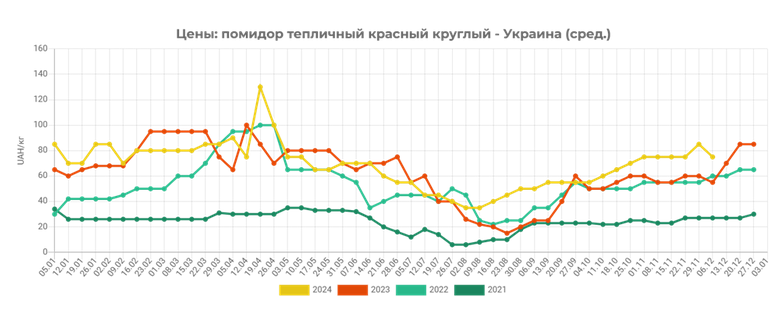
At the same time, the supply of imported tomatoes in the Ukrainian market continued to increase gradually, which was the main reason for the price decrease in this segment. Thus, today greenhouse tomatoes are on sale at UAH 70-80/kg ($1.68-1.92/kg), which is on average 11% cheaper than at the end of the last working week. The main reason for the negative price trend in the segment of greenhouse tomatoes, producers call a sharp decline in demand for this product, as well as the quality of vegetables offered.
It should be added that today imported tomatoes in Ukraine are already sold on average 54% more expensive than in the same period last year. However, most representatives of wholesale companies do not exclude further price reduction. According to traders, if the current sales rates are maintained, they will be forced to concede in price again in order to prevent the accumulation of unsold products in warehouses.
You can get more detailed information about the development of the market of greenhouse tomatoes and other horticultural products in Ukraine by subscribing to the analytical weekly EastFruit Ukraine Weekly Pro. Detailed information about the product can be found here.

UK residential property prices in November rose by a two-year high of 4.8% in annualized terms, according to a report by Halifax. The growth is recorded for the twelfth consecutive month. In October, according to revised data, the rise was 4%, not 3.9%, as previously announced.
In November, housing prices increased by 1.3% compared to the previous month.
As a result, the average cost of a property in the country reached 298,083 thousand pounds ($380.3 thousand) and updated the record for the second month in a row.
Analysts expected last month’s growth of 3.6% year-on-year and 0.2% month-on-month, the Financial Times reports.
“The latest data show further improvement in mortgage demand as mortgage rates fall, boosting buyer confidence,” said Amanda Bryden, head of mortgage at Halifax. ”However, despite these positive trends, many potential buyers and those moving are still experiencing significant difficulties in terms of housing affordability, and buyer confidence may be shaken by the changing economic situation.
Borrowing costs remain higher than the average level of a few years ago, and therefore housing prices will grow at a moderate pace, she added. In her view, they should be supported by positive labor market data and the expected decline in interest rates.
Source: http://relocation.com.ua/tsiny-na-zhytlo-u-velykij-brytanii-prodovzhuiut-zrostaty/

On December 5, Dniprovodokanal communal enterprise Dniprovskyi city council announced a tender for compulsory motor third party liability insurance, according to the Prozorro e-procurement system.
The expected price is UAH 2.067mn.
The last day to apply for participation is December 13.
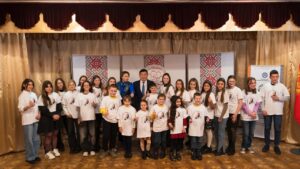
The Embassy of Kyrgyzstan in Ukraine celebrated the 100th anniversary of the formation of the Kara-Kyrgyz Autonomous Region with a solemn event held at the National Library for Children in Kyiv. The central event was the summing up of the All-Ukrainian Children’s Drawing Contest dedicated to the works of Chingiz Aitmatov, timed to the 95th anniversary of the great writer.
The contest brought together more than 1.5 thousand children from all regions of Ukraine. Of these, 113 participants who passed the regional qualifiers were awarded prizes from the Embassy. The event was attended by more than 30 finalists and winners together with their parents, as well as representatives of the diplomatic corps, international organizations, political and public figures of Ukraine. Representatives of the Kyrgyz diaspora also took an active part.
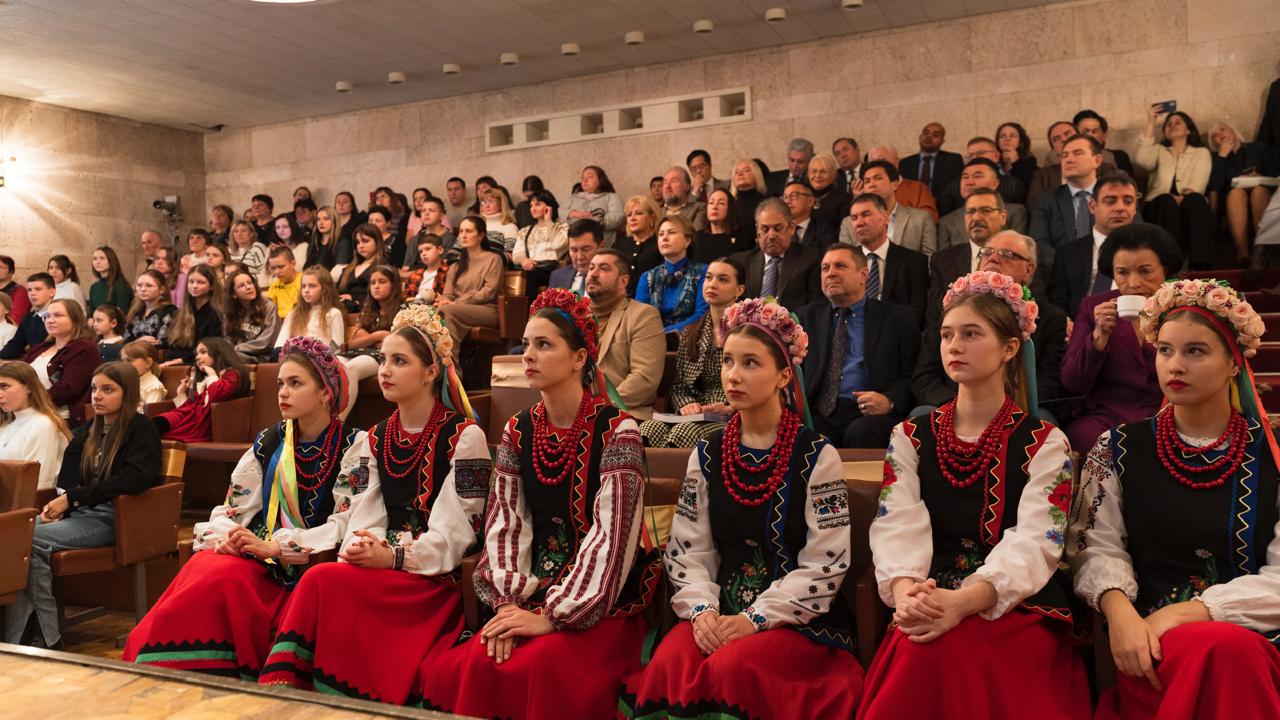
Askar Aitmatov, President of the Aitmatov International Issyk-Kul Forum, addressed the participants with a special video message. As part of the celebrations, young artists who came to Kyiv received valuable gifts, and adults who made a significant contribution to the popularization of Turkic-language literature were awarded medals from the international organization TURKSOY and the Aitmatov Foundation.
The Embassy presented a unique almanac, which includes the best children’s works. The publication is planned to be handed over to educational institutions in Kyrgyzstan, Ukraine and the European Union, contributing to the dissemination of the cultural heritage of Chingiz Aitmatov and strengthening ties between peoples.
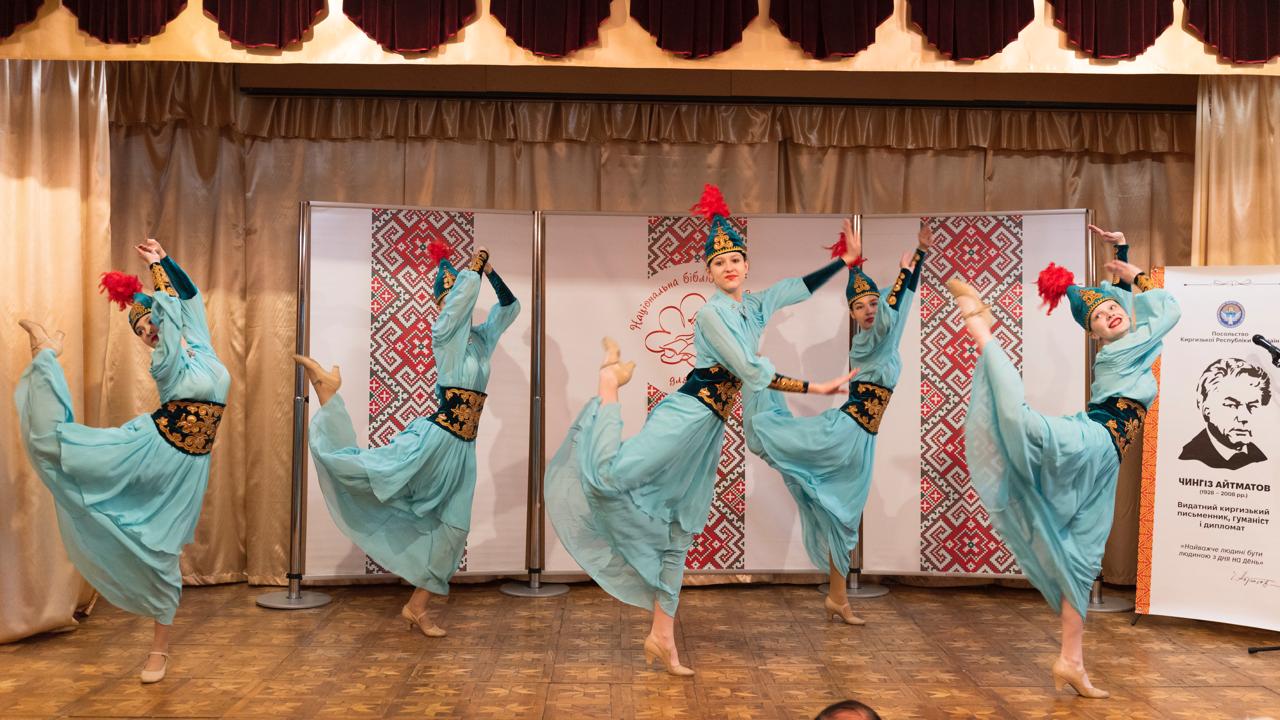
During the event, the importance of cultural diplomacy as a powerful tool for strengthening friendly relations between countries was repeatedly emphasized. The event was well received by the Ukrainian media, becoming an example of successful interaction between the two nations through art and literature.
The contest was an important step in popularizing Turkic-language literature, including the works of Chingiz Aitmatov, in Ukraine. It also contributed to strengthening cultural ties between Kyrgyzstan and Ukraine by emphasizing the role of art in intercultural dialogue.
The event was held in compliance with all security measures appropriate to wartime conditions and demonstrated the importance of cultural cooperation in difficult times.
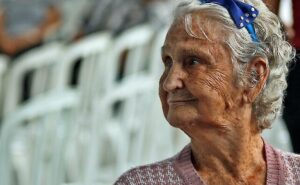
Ukrainian pensioners who receive payments to a bank account and reside in Spain, Latvia, Lithuania, Estonia, Slovakia, Czech Republic, Bulgaria, Portugal, Poland, must annually until December 31 send to the Pension Fund of Ukraine an officially certified document confirming the individual alive.
According to the website of the Pension Fund of Ukraine, pensioners receiving pension payments through the competent authority of the above states, with which Ukraine has concluded an agreement on the proportional principle, are identified in these bodies.
The report specifies that Ukraine has concluded a number of international treaties on social (pension) security, which regulate, in particular, the procedure for the payment of pensions to citizens who have left for permanent residence abroad. This means that each of the signatory states assigns and pays pensions for the insurance record acquired on its territory. The insurance experience acquired in the territory of another treaty state is taken into account only for determining the right to a pension.
Payment of such pensions is made quarterly by transfer to the personal accounts of pensioners opened in banks of the countries of residence or through the competent authority of the treaty State.
Samples of applications for confirmation of the person’s survivorship are available on the information page of the e-services web portal of the Pension Fund of Ukraine.